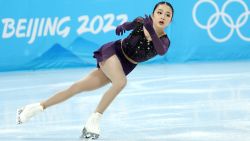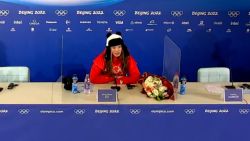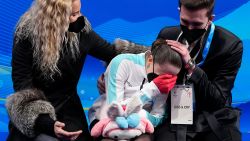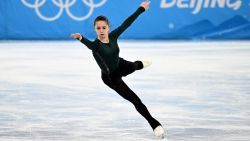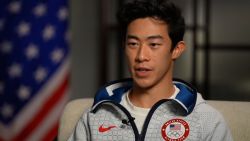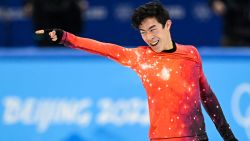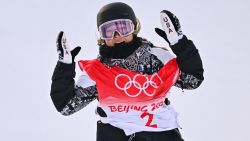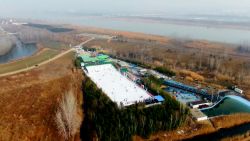Making her Olympic debut for Team China, California-born figure skater Zhu Yi was eager to prove herself to the Chinese public.
Instead, the 19-year-old is facing a firestorm on Chinese social media after she fell flat on the ice and finished last in the women’s short program team event Sunday.
On Weibo, China’s Twitter-like platform, the hashtag “Zhu Yi has fallen” gained 200 million views in just a few hours. Many questioned why Zhu, an American-born skater, was picked to represent China at the expense of an athlete born in the country.
“This is such a disgrace,” said a comment with 11,000 upvotes.
By Sunday evening, the hashtag appeared to have been censored. It is unclear why.
Zhu was the first to compete on the second day of the figure skating team event, gliding into the ice rink to loud cheers from the mostly Chinese crowd at Beijing’s Capital Indoor Stadium.
But she tumbled and crashed into the wall after a failed jump in the opening combination, and missed another jump later in the program, finishing with the lowest score of the event.
China consequently fell from third place to the fifth in the standings – just enough to progress to the next round of competition.
“I’m upset and a little embarrassed,” Zhu said after the race, wiping her tears.
“I guess I felt a lot of pressure because I know everybody in China was pretty surprised with the selection for ladies’ singles and I just really wanted to show them what I was able to do but unfortunately I didn’t.”
Pressure to perform
Chinese athletes face huge pressure to get results at the Olympics, with medal counts long touted by the Chinese government as a sign of national strength. In the past, many have faced a backlash for poor performances.
Zhu is among at least a dozen foreign-born athletes recruited by China in recent years in an attempt to bolster its medal count at the Winter Olympics. But the attack against her also highlights the pressure these naturalized athletes face to compete under the Chinese flag.
Born in Los Angeles to a Chinese immigrant family, Zhu decided to compete for China in 2018 and gave up her American citizenship. She also changed her name from Beverly Zhu to Zhu Yi.
But she has faced criticism in China for not being able to speak fluent Chinese.
“Please let her learn Chinese first, before she talks about patriotism,” a Weibo user said on Sunday.
Others have taken aim at her allegedly privileged background and family ties. Zhu’s father, Zhu Songchun, is an award-winning artificial intelligence scientist. He joined Peking University from the University of California, Los Angeles in 2020.
The attack on Zhu stands in stark contrast to the huge popularity of California-born Eileen Gu, a freestyle skiing prodigy who is also competing for China.
The 18-year-old has charmed the Chinese public with her fluent Mandarin and familiarity with Chinese culture, having grown up spending summer holidays in Beijing. She has become China’s unofficial face of the Winter Olympics, featuring heavily in state media coverage to promote winter sports, as well as advertisements for Chinese brands.
Gu is due to make her Olympic debut in the women’s freeski big air qualifications on Monday morning. On Weibo, where Gu has 1.9 million followers, the hashtag “Eileen Gu’s first show” is trending on Sunday night with more than 300 million views.
Reuters contributed reporting




